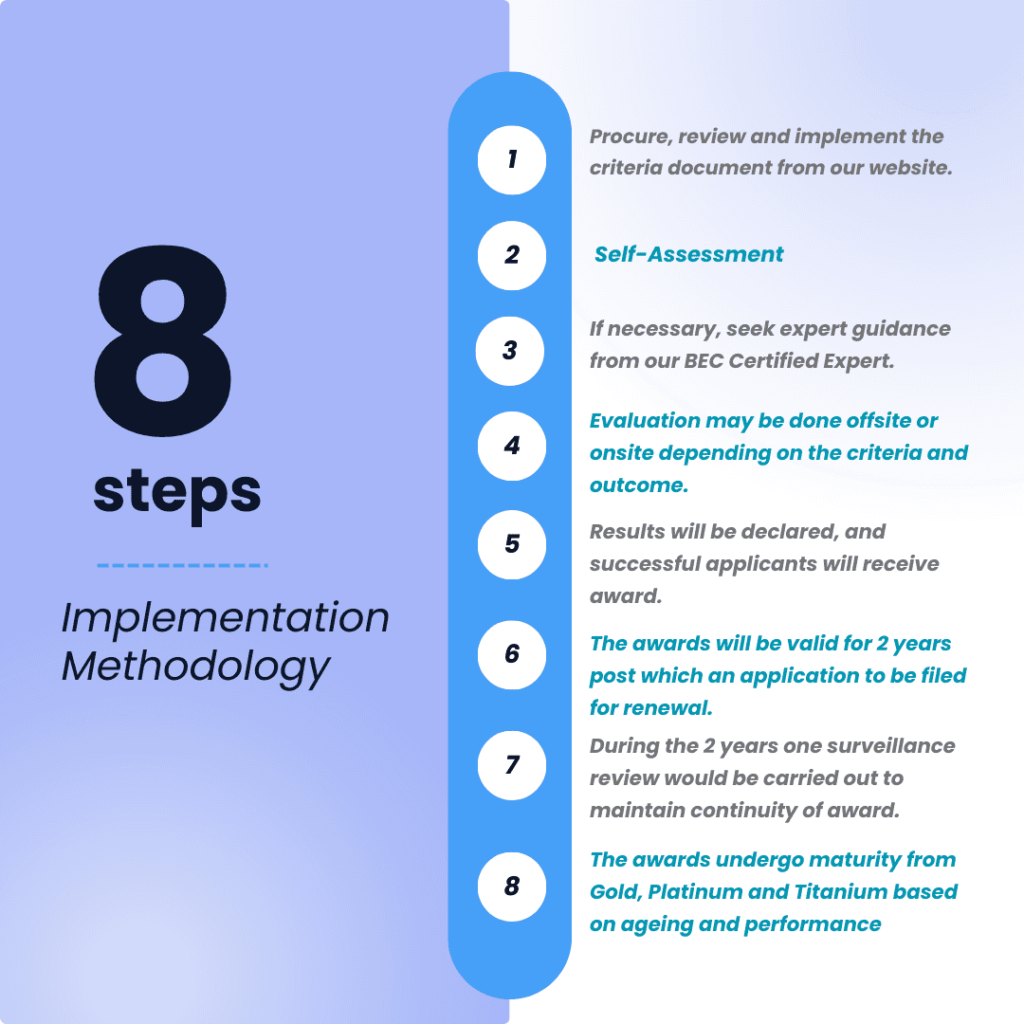Awards
These are the standards developed by the Industry Expert fraternity and are used to evaluate the performance of any organisation. They deal with various areas and you may refer to the detailed list given below.
GEE respects and mutually agrees to other initiatives that are already established over the years. GEE utilizes these criteria also to help in assessment of companies.
GEE also assists corporates in development of Customized Excellence models, through the use of industry experts. These may eventually be used for assessment by the organisation

FAQs
The BEC offer a well-defined criterion, that is developed by experts in the relevant fields. These criteria are optional and not a policing exercise. Their sole intent is to provide education to the industry in order to achieve business excellence. By use of these criteria you will be able to evaluate how your organization performs vis a vis industry benchmark.
Each organisation is free to choose their framework for improvement. GEE not competing with any other standard, in fact is working hand in hand with all other criteria. The sole mission with which gee is working is to enable improvement in the industry. The means may be many, but the goal is one.
Yes, most of the BEC can be implemented regardless of the size, complexity, nature of business, language, location or any other factor. The sole intention is to enable improvement. There are a few bec that may be sector specific and would logically be implemented only by the relevant field
GEE offers an evaluation of the bec implementation directly or through its bec expert partners. The organisation is free to choose any partner for evaluation. We strongly recommend that the organisation go through a recognized list of partners for implementation or recognition to ensure quality of work.
Implementation of bec may vary from organisation to organisation. The current state of affairs, the culture, current resources, technology, general socio-political environment etc. May affect the ease and cost of implementation. Each bec is designed for stringent business excellence and would surely not come free. Although, it is assured that effective implementation will return the investment. Recognition (certification) costs are defined and are directly proportional to the size and scope (number of persons, sites and nature of business). These costs are transparent, and feel free to request the cost for your organisation by contacting your nearest representative.
Business Excellence Criteria
| Code | Description |
|---|---|
| BEC 1 | Integrated Requirement Excellence Criteria (A combination of 2 or more of BEC) |
| BEC 100 | Housekeeping Excellence Criteria |
| BEC 200 | Productivity Excellence Criteria |
| BEC 201 | Just in Time Manufacturing |
| BEC 202 | Total Maintenance Management Excellence |
| BEC 203 | Continual Improvement Excellence |
| BEC 300 | Quality Excellence Criteria |
| BEC 301 | Six Sigma Excellence |
| BEC 302 | TQM / Zero Defect |
| BEC 303 | Inspection Free Quality |
| BEC 400 | Sustainability Excellence Criteria |
| BEC 500 | Innovation and Design Excellence Criteria |
| BEC 600 | Environmental Excellence Criteria |
| BEC 700 | Health & Safety Excellence Criteria |
| BEC 701 | Behavioral-Based Safety Excellence Practices |
| BEC 702 | Fire Safety Excellence Practices |
| BEC 703 | Machinery Safety Excellence Practices |
| BEC 800 | Business Ethics & Corporate Governance Excellence Criteria |
| BEC 900 | Corporate Social Responsibility Excellence Criteria |
| BEC 1000 | Information Technology & Security Excellence Criteria |
| BEC 1100 | Retail Services Excellence Criteria |
| BEC 1400 | E-commerce Services Excellence Criteria |
| BEC 1500 | Human Rights Excellence Criteria |
| BEC 1501 | Human Resource Excellence Practices |
| BEC 1502 | Social Accountability Excellence Practices |
| BEC 1600 | Hospitality Management Excellence Criteria |
| BEC 1601 | Food & Beverage Excellence |
| BEC 1602 | Facility Management Excellence |
| BEC 1700 | Good Manufacturing Practices |
| BEC 1701 | Good Manufacturing Practices |
| BEC 1702 | Good Laboratory Practices |
| BEC 1703 | Good Warehousing Practices |
| BEC 1704 | Good Kitchen Practices |
| BEC 1800 | Educational Services Excellence Criteria |
| PSR | Product Sustainability Rating |
| PSR 2022 | Product Sustainability Rating for 2022 |
Standards and Guidelines
| Organization/Standard | Description |
|---|---|
| WHO | GMP - World Health Organization: Good Manufacturing Practices |
| Regulation | GDPR – General Data Protection Regulation |
| Quality Management | ISO 9001:2015 - Quality Management Systems |
| Six Sigma | eISO 13053-1:2011 - Six Sigma |
| Environmental Management | ISO 14001:2015 – Environmental Management Systems |
| Occupational Health & Safety | ISO 45001:2018 – Occupational Health & Safety Management Systems |
| Social Responsibility | ISO 26000 – Social Responsibility Guideline |
| Sustainable Procurement | ISO 20400 – Sustainable Procurement Guideline |
| Food Safety Management | ISO 22000:2018 – Food Safety Management Systems |
| Information Security Management | ISO 27001:2013 – Information Security Management Systems |
| Risk Management | ISO 31000 – Risk Management Guideline |
| Asset Management | ISO 55000 – Asset Management Guideline |
| Social Accountability Management | SA 8000 – Social Accountability Management Systems |
| European Certification | CE – Conformity European Certification for Products |






